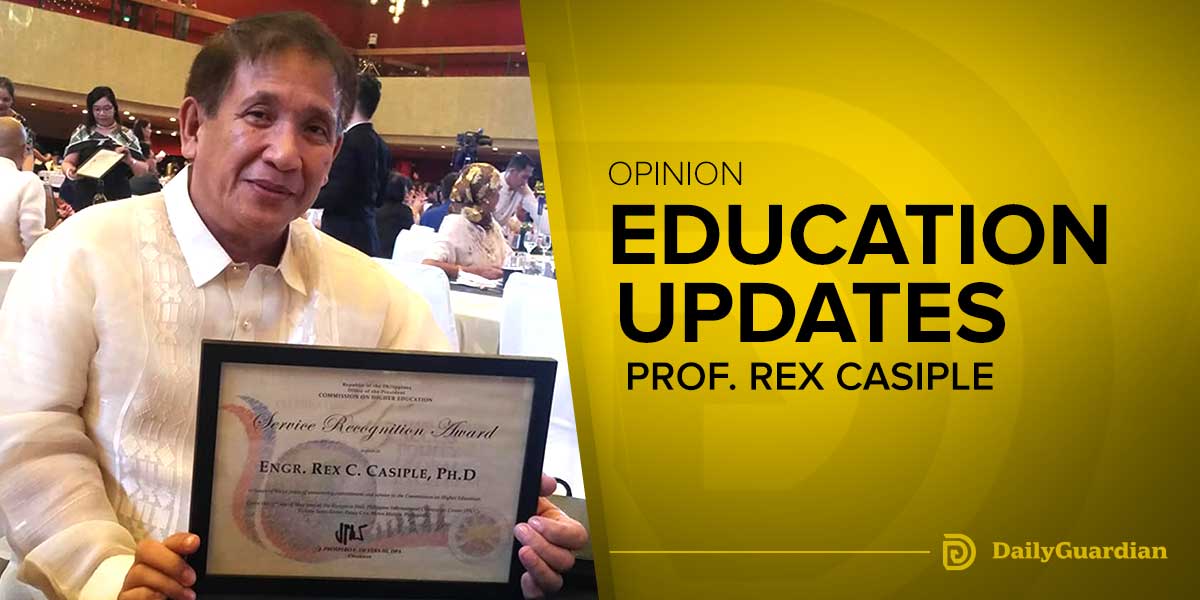By: Dr. Rex Casiple
CLASSES in the tertiary level started on June 3, 2019. However, some private colleges and universities may start their classes after this date but not later than June 24, 2019.
In Western Visayas Region, around 200,000 or more college students are expected to be back to schools this academic year (AY) 2019-2020. Business Education courses still are the most popular courses in the tertiary level. Students were advised to enroll in courses in demand in the next 5 to 10 years, such as, Agriculture and Fisheries, Engineering, Science and Mathematics, Information Technology, Teacher Education and Health related programs.
Generally, as an after effect of senior high school (SHS) offerings three years ago, there will be no enrolment in the third year and fourth year levels except in those higher education institutions (HEIs) opted to accept old third year and fourth year college enrollees.
All public and private higher education institutions (PHEIs) in the Region are expected to do usual activities in preparation for the opening of classes, preferably in crime prevention and control, food services/safety and student services, drug abuse prevention and control, anti-smoking law implementation, posting of the certificates of new permits and recognition of courses offered, conduct of student orientation with campus tours and student internship programs, among others.
In Crime Prevention and Control, HEIs are expected to conduct crime prevention seminar with the Philippine National Police (PNP) personnel. In Food Services/Safety and Student Services some HEIs constructed new canteens, conducted annual check-up for the sanitation permit of the canteen and nearby carinderia, constructed students dormitory, conducted annual evaluation of school dormitories and nearby boarding houses, installed elevators for PWD and students with special needs, conducted seminar on disaster preparedness, etc.
In Drug Abuse Prevention and Control, HEIs are expected to conduct lectures on dangerous drugs and drug abuse prevention and awareness. In compliance with Anti-smoking law implementation, HEIs posted No Smoking notices inside the campus.
No students shall be accepted for enrolment unless they present the proper school credentials on or before the end of the enrollment period for the school term. Any violation of this rule may subject the erring HEI to possible administrative penalties and sanctions.
Refresher course student, or student who failed for several times in any licensure examination, may be admitted to an HEI at any time during a school term for audit purposes without earning credits, subject to requirements and conditions that the concerned HEI may prescribe. At the discretion of the HEI, a refresher course student may be exempted from class assignments and examinations.
State colleges and universities in the Region, as well as Commission on Higher Education (CHED) recognized local colleges, decided to open their classes this AY 2019-2020 in August 2019. This is to synchronize their respective academic years with fiscal year (FY) starting FY 2020.
Per Republic Act 10931 or the Universal Access to Quality Tertiary Education Act of 2017, SUCs and CHED recognized local colleges are not allowed to charge tuition fees and basic miscellaneous fees, such as, library fees, computer fees, laboratory fees, school ID fees, athletic fees, admission fees, development fees, guidance fees, handbook fees, entrance fees, registration fees, medical and dental fees, cultural fees, and other similar or related fees.
Students who cannot afford to enroll in a private school due to high cost of tuition and other fees are advised to enroll in state colleges and universities for free. They have to maintain passing grades in order to be retained until graduation.
To avoid consequences of enrolling in fake courses, incoming college students are advised to secure or look for programs permit or recognition certificates issued to school by the CHED. Students and parents should be vigilant and report these fake courses to proper authorities.




















